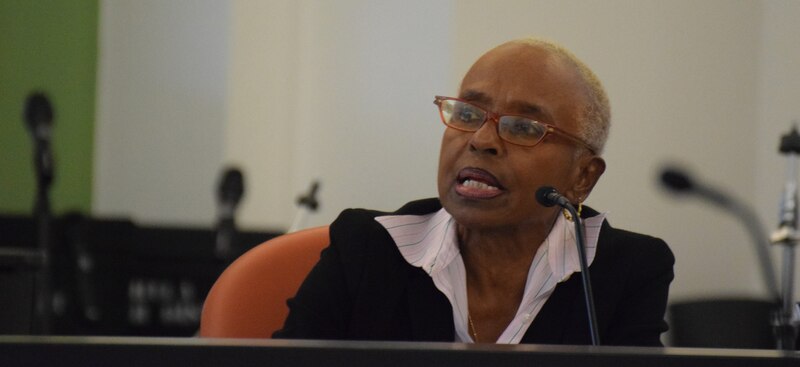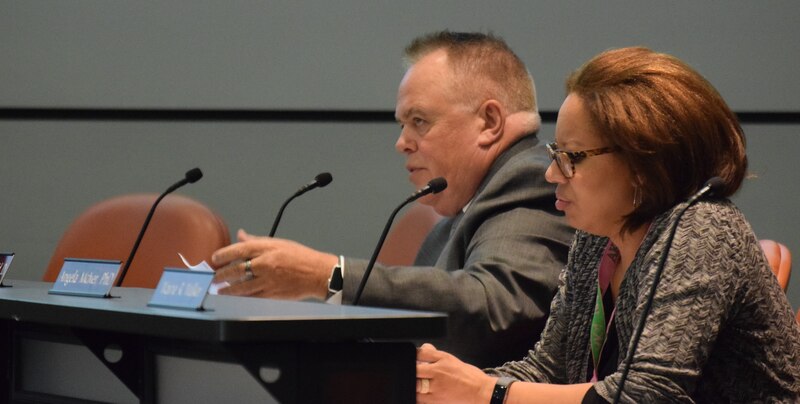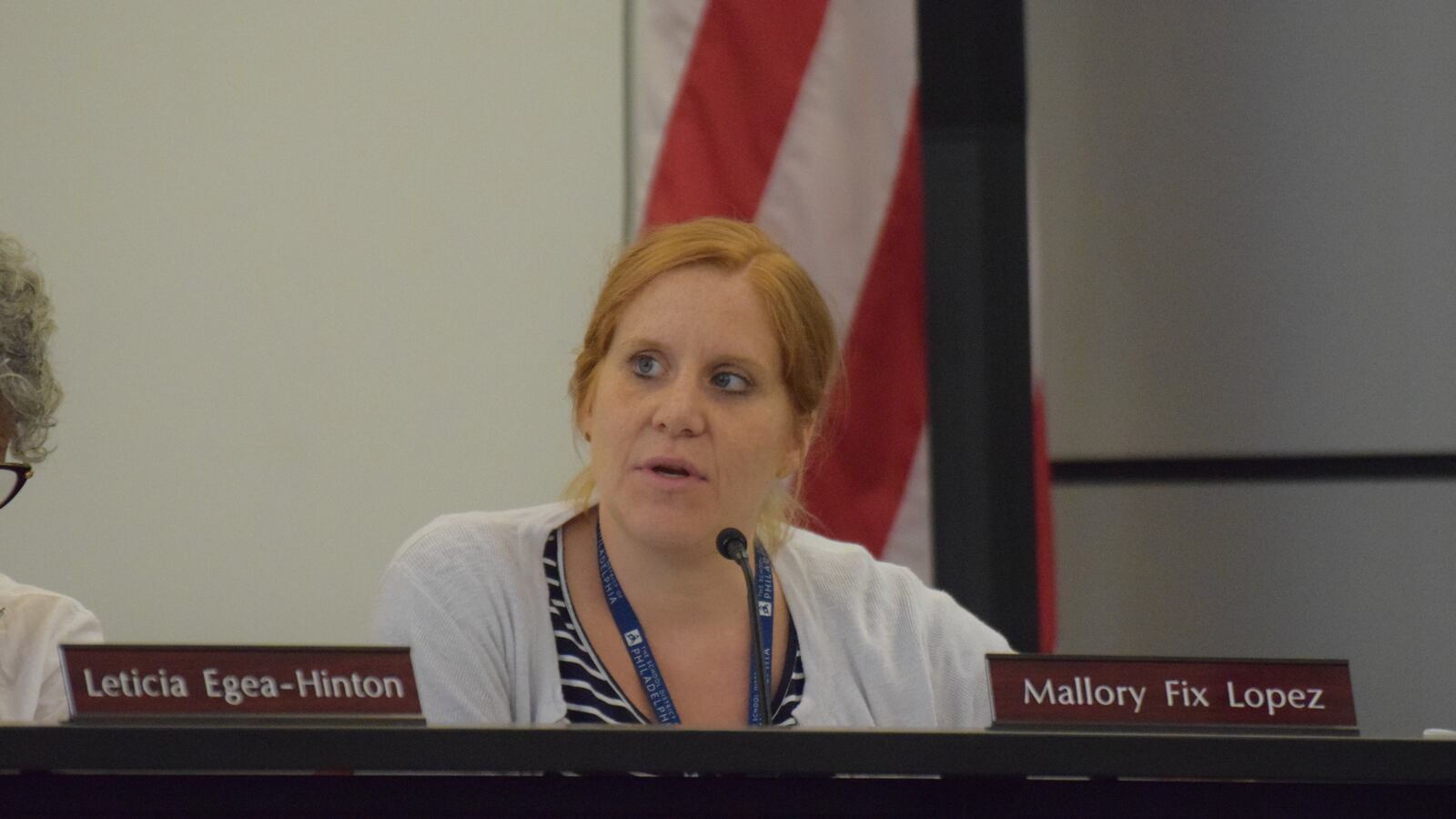This article was originally published in The Notebook. In August 2020, The Notebook became Chalkbeat Philadelphia.
The Philadelphia Board of Education made decisions on three charter school matters Thursday, closing one school, denying a revised application for a new charter, and shooting down the first application from a charter school operator to incorporate all of its schools into one entity.
The board had already voted to begin closing Charter High School of Architecture & Design (CHAD), and the charter school was preparing to fight the decision in upcoming hearings. But on Thursday, the school board voted to accept a last-minute agreement with CHAD to close the school voluntarily.
CHAD will close in June 2020, and the District will work with the school to find other high schools for its remaining students. The District and CHAD worked together on a Memorandum of Understanding to “explore the establishment of an architecture and design school or program managed by the School District,” according to the school board resolution. However, the school will close regardless of whether the two are able to agree on a plan.
“We don’t have a design-thinking program in the District,” said Superintendent William Hite. “CHAD has developed a design-thinking school, and we have an opportunity to work with them.”
Design-thinking is a teaching technique that uses hands-on projects to teach students creative problem-solving.
School board member Mallory Fix-Lopez liked the idea of incorporating CHAD’s “design-thinking” pedagogy into a new or existing District high school, but worried that talk of potentially opening such a program in 2020 was premature, given the short timeline. She stressed that the school would need a strong principal already versed in its pedagogy.
“To do something like this takes a lot of planning,” Fix-Lopez said. “It seems like a lot of work – organizationally – within just one year.”
Hite agreed, and reiterated that the program would only open if and when it was ready.
“It’s going to take some time,” Hite said.
School board member Maria McColgan asked whether CHAD would be accepting 9th-grade students next year. Initially, Christina Grant, interim director of the Charter Schools Office, said it would not be accepting new students. But Hite said the school would take another 9th-grade class because those students were already accepted by the time the District struck the deal.
In an interview before the meeting, board member Chris McGinley said the deal was worked out by Hite and his office.
“I want to thank the CHAD community,” said Board President Joyce Wilkerson. “It’s been a very constructive conversation, and I hope that this can be a model for other [charter school] situations in front of the board.” She said the board’s Student Achievement Committee would give updates on the memorandum of understanding with CHAD.
Joan Myers Brown Academy reapplication
String Theory applied to open the Joan Myers Brown Academy – a performing arts charter school focused on dance – but was denied in March. Many school board members applauded the application’s vision but criticized a lack of specifics, including the absence of a dance curriculum. The school revised its application and reapplied.
The Charter Schools Office evaluated the revised application and found that it was still missing comprehensive curriculum for music, dance, theater, and visual arts “or any documents supporting a Dance program inspired by Joan Myers Brown.”
String Theory now manages two charter schools. Its Renaissance charter, Philadelphia Charter School for the Arts & Sciences at Edmunds, expired in 2017, and the organization has so far refused to sign the new charter offered by the school board.
The evaluation of the proposed new school found that its academic goals were not “credible” based on the academic history of String Theory’s existing schools. One particularly ambitious goal is to increase test scores “across all subgroups at a rate 50 percent faster than the state performance goals” in both English and math.
But the evaluation found “the applicant’s existing schools currently fail to meet those goals for the significant majority of the subgroups of students they serve.”
Board members unanimously voted down the reapplication.
“While I’m in favor of a school that incorporates the arts, this application does not meet the standard,” said board member Julia Danzy. McGinley agreed.

School board member Julia Danzy speaks at the board’s June 13 action meeting. (Photo: Greg Windle)
Multiple Charter School Organizations
In 2017, the state legislature passed an act allowing for the consolidation of a network of charter schools operated by the same management group into one entity called a Multiple Charter School Organization (MCSO), although such consolidations must be approved by the authorizing school district. Charters must meet certain academic standards to qualify. Freire Charter Schools is the first in Philadelphia to apply to become a MCSO, which would allow the board of Freire to control all of its schools. It has two in Philadelphia.
Without such an organization, charter management companies must allow individual schools to form their own boards. Each of those boards governs each school and can decide whether to renew and whether to renegotiate the management company’s contract. However, in practice, the board members of individual schools are often recruited by the founding management company and simply act as rubber stamps, creating the illusion of more independence than actually exists. Although this practice went uncriticized during the years of the state-controlled School Reform Commission, the new school board is taking a hard look at how charter schools are governed.
Members of the Alliance for Philadelphia Public Schools, a longtime watchdog group that attends each board meeting, testified against the idea of Multiple Charter School Organizations.
“This concept is simply a further attempt by charters to evade oversight and accountability,” said APPS member Lynda Rubin. “I’m concerned that an MCSO would allow the schools to be treated as a unit rather than individual schools.
“It’s been easier to open new charter schools than to regulate or close failing charters. They use branding and public relations techniques to convince the public how excellent they are. … The MCSO process is the first step towards taking control of as many students and grade levels as possible, with the intention to eventually petition the state for direct oversight – effectively seceding from the School District of Philadelphia.”
Rich Migliore, an education lawyer and member of APPS, said the very idea of MSCOs violated the education clause of Pennsylvania’s constitution.
“The intended purpose of that [MCSO] statute is to circumvent our school boards,” Migliore said. “So the intent is to circumvent the very processes of democracy embodied by our school districts.
“It will create two public school systems: one publicly governed and another privately operated. This denies our citizens their liberty-rights to participate meaningfully in the governance of what are supposed to be our public schools.”
Freire Charter Schools apply for MCSO
Freire charter schools serve roughly 2,000 students in grades 5-12 across three schools. The first, Freire Charter School, opened as a high school in 1999 and later expanded to serve grades 5-12 in 2012. Freire opened another school in Wilmington, Delaware, in 2015, and then TECH Freire Charter School in Philadelphia in 2016 as a high school. Around the time that those last two schools opened, Freire founded Build the Future Education Collaborative, the company that manages its schools. Only the two schools in Philadelphia would merge, governed by one board.
In its application for an MCSO, Freire argues that forming one would create “a common vision and purpose” and “capitalize on economies of scale” by centralizing services that are now spread out over the individual schools.
“The Freire brand will be strengthened with the unification of our PA schools, establishing us as a top charter network in the region with increased name recognition,” the application reads.
The Charter Schools Office found the application’s statement of achieving a greater economy of scale to be unsubstantiated by Freire’s proposed budget. Over the last two years, both schools have spent more than budgeted but revenues were also higher than expected so the schools avoided running deficits. The MCSO’s budget anticipated an increase in salary expenditures of nearly 10 percent, and “of greater concern” was a 55 percent increase in salaries spent on administrative staff.
“The Freire MCSO Application does not contemplate any changing or consolidating staffing to improve the quality of education provided to students or reflect economies of scale,” the charter office evaluation reads. Instead, it largely gives raises to existing positions.
A spokesperson for Freire disputed the 55 percent salary increase for administrators, saying the increase was just below 16 percent. And the 10 percent increase in total salaries will help pay for additional special education teachers for the network.
TECH Freire also up for renewal
This year, its third school year, TECH Freire was recommended for renewal, but only for one year before it is reviewed again by the school board. The usual charter term runs for five years. TECH Freire does not meet the District’s standard in academics or organization, though it “approaches” the standard in organization.
The school failed the academic portion due to low numbers of students scoring on grade level, particularly in algebra and biology. Though the school prides itself on technology-based learning, the charter office found little evidence of this during a site visit, where it also found many students to be off task.
For TECH Freire’s low score in the organization category, the Charter Schools Office cited a failure to consistently identify and provide services for English Learners in a timely manner.
The school did not have a certified principal for the 2017-18 school year. Suspensions are higher in each grade than both the School District average and the average of similar schools, which combines District and charter schools with similar student demographics. And each year, more than 20 percent of teachers left and were replaced by new hires.
Board members’ concerns about MCSOs
Freire’s application for an MCSO was unanimously voted down, with some board members criticizing the whole MCSO process and others simply voting against this particular application.
McGinley said he shared many of the concerns about MCSOs expressed by members of APPS.
“Charter schools that qualify to form an MCSO, based on their level of academic performance, tend to have less children in poverty than our average Philadelphia public school,” McGinley said in an interview. “I’m concerned that this could enable charter school operators to cut up the city and cater services to more middle-class families rather than to all families.”

School board member Chris McGinley speaks during the action meeting. (Photo: Greg Windle)
McGinley clarified for the audience that even though an MCSO would disband the individual school boards, each school would still have a separate charter and would be evaluated individually.
“This application seemed uninformed about that,” McGinley told the audience. “In fairness to anyone who does apply for an MCSO, the guidance within the law is so minimal that it’s easy to make mistakes.”
Danzy criticized the legislation allowing for MCSOs, saying it was “designed to subvert some of the oversight that charters should have.” Member Leticia Egea-Hinton agreed.
School Board Vice President Wayne Walker voted to deny, adding “I, too, am concerned about a tale of multiple districts.”
Member Lee Huang also voted to deny, but added that “my vote is based on the application and has nothing to do with my opinions about MCSOs.”


